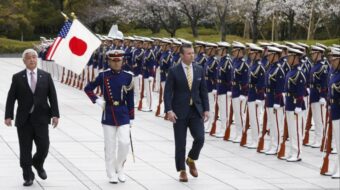Opinion
We forget stories at our peril. Stories of violence, racism and militarism testify to the existence of an overarching system. Minders of the status quo would have the rough edges of such stories glossed over, would have us forget them.
Many of us living in the “belly of the beast” stood up against war in Iraq, but the footprints from previous escapades of the beast, and the devastation, are also plainly visible. The plea here is, yes, oppose war and aggression, but keep in mind too the larger context of our struggle.
On April 4, 1967, Martin Luther King delivered a speech against war in Vietnam. “The war in Vietnam,” he said, “is but a symptom of a deeper malady within the American spirit. If we ignore this sobering reality, we will find ourselves organizing committees for the next generation … unless there is a significant and profound change in American life and policy.” King was talking about a resistance movement that went from issue to issue and dealt mainly with outward manifestations. He wanted us to think about fundamental matters of causation.
Stories provide a hint as to the basics. For example, in the last century U.S. troops went into Latin American nations on more than 100 occasions. Testifying before Congress in 1935, General Smedley Butler stated, “I was a high-class muscle man for big business, a racketeer for capitalism … made Mexico safe for American oil … made Haiti and Cuba a decent place for the National City Bank boys. I helped in the rape of half a dozen Central American republics for the benefit of Wall Street. I helped purify Nicaragua for the banking house of Brown Brothers. I brought light to the Dominican Republic for American sugar interests in 1916.”
And more: In 1954 The CIA deposed an elected Guatemalan government, and military forces there, using U.S. arms and supported by the CIA, went on over four decades to kill 200,000 Guatemalans. In Indonesia Suharto’s military killed 500,000 supposed communists in 1965 and later killed 200,000 people in East Timor. Both massacres were carried out with U.S. arms and with a green light from Washington. In 1973, a CIA-engineered military coup overthrew an elected Chilean government and triggered thereby the death of thousands. 35,000 U.S. troops invaded the Dominican Republic in 1965. So the exportation of war and mayhem is an American habit, one now on display in Iraq.
The people in these stories are shot, killed, mutilated, and starved. Victims are often thin, dark-skinned, shirtless and shoeless. Military power is the tool of choice. Commercial interests and corporations are waiting in the wings. Anti-war protesters would do well to take a long view and study Dr. King’s “sobering reality.” “Every nation,” he said, “must now develop an overriding loyalty to mankind as a whole in order to preserve the best in their individual societies.” For that ideal to become a reality unity is needed, and opposition to institutionalized greed and power.
For us to forget issues like a failed health care system, the blockade against Cuba, and tax cuts for the rich would surely be welcomed by top dogs in Washington. Giving up on all issues except war, we might find ourselves assigned to the one category of anti-war protest – a single pen – thereby facilitating our own repression.
So why not take on the empire itself, the over-arching system? Giants are weakened in the middle from injuries around the edges. Stones in shoes make them limp. Cuba, for example, represents an alternative to a market economy gone global, and the war in Iraq was fought to protect the U.S. stake in that system. Solidarity with Cuba, therefore, has anti-war overtones, as does the fight for universal health care.
W. T. Whitney Jr. is a part-time pediatrician in rural Maine. He can be reached at pww@pww.org









